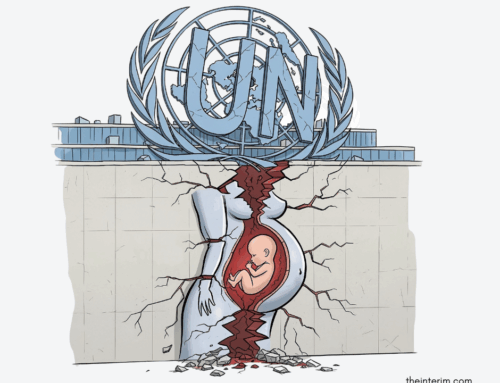On June 5, Candice Rochelle Bobb’s son passed away at Sunnybrook Health Sciences Centre in Toronto. Just three weeks earlier, he had been delivered prematurely by emergency C-section after his mother, who was then 24 weeks pregnant, was fatally shot in Etobicoke while sitting in the backseat of a vehicle. No one has yet to be arrested for the crime but the question remains: if someone were to be charged for Bobb’s death, would they be charged with the death of her baby boy too?
After the boy passed away, the Toronto police consulted with the Crown about that possibility, though the child was not immediately announced as a murder victim. However, there was no similar consultation in December 2014 after seven-months pregnant Cassandra (“Cassie”) Kaake and her unborn daughter Molly were murdered in their home in Windsor. Kaake’s killer, Matthew Brush, would only be charged with her murder, and not her daughter’s, because of a crucial legal difference between their case and that of the Bobbs: Molly died while in the womb, while Bobb’s son died outside of it.
This difference mattered when 66-year-old Ruth Burger hit eight months pregnant Danah McKinnon-Bozek and her two daughters aged six and three with her vehicle at a Costco store in London, Ont., in July 2014. The six-year-old died and so did the newborn baby girl (Rhiannon), a week later. As such, Burger was charged with two counts of criminal negligence causing death and two counts of criminal negligence causing bodily harm.
Currently, according to s. 223 (1) of the Criminal Code a “child” does not become a human being until it is has “completely proceeded, in a living state, from the body of its mother.” This means that if a person causes harm to a child before birth and the child dies as a result, it is only considered a homicide if the death occurs after the child has been delivered.
Jeff Durham, Molly’s father, is seeking to change that. After his daughter’s death, Durham launched the “Molly Matters” campaign, which has garnered more than 15,000 signatures. MP Cathay Wagantall (CPC, Yorkton-Melville) took up his cause and on Feb. 23 of this year tabled Bill C-225 or “Cassie and Molly’s Law,” which would make it a separate (but not stand-alone) offense “to cause injury or death to a preborn child while committing or attempting to commit an offence against a pregnant woman” and would codify pregnancy as an aggravating factor for sentencing.
At second reading of the bill on May 2, opposition MPs expressed their dissatisfaction; despite all the scientific evidence to the contrary, they wanted the woman and her fetus to be thought of as a single entity. MP Bill Blair (Lib., Scarborough Southwest) disputed whether this bill would lengthen the sentence of an offender at all, since the sentences could just be served concurrently. Wagantall clarified that her bill did not require the unborn be considered “human beings” in the legal sense. The bill is worded particularly to exclude abortion, but that did not prevent claims that this bill would open up the door to the abortion debate.
Joyce Arthur of the Abortion Rights Coalition of Canada (ARCC) and Durham, who both identify as pro-choice, have feuded over the bill. Durham’s comments have been deleted from the ARCC’s Facebook page, which has only spurred him on. On the Molly Matters website, he described Arthur as “a cancer to the rights of these women,” and called out Arthur for being “anti-choice,” as Durham insists the bill protects a woman’s choice to carry her child to term. Arthur, on the other hand, pointing to states like South Carolina, where pregnant women have been taken into custody for abusing drugs, contests that the bill would compromise women’s rights by enshrining fetal personhood – a claim that has managed to get similar proposed legislation quashed.
Former MP Leon Benoit (CPC, Vegreville-Wainwright) tabled Bill C-291 in 2006, which was intended to accomplish the same goal as Bill C-225, but it was deemed unconstitutional and, thus, non-votable, by a parliamentary subcommittee that examines private member’s business, because it did not exempt abortion (though Benoit asserted it did). When presenting the bill, he pointed out that animals have more legal protection than the unborn and called the current law “outdated and heartless.”
A similar bill, C-484, called the Unborn Victims of Crime Act, was introduced a year later by then MP Ken Epp (CPC, Edmonton-Sherwood Park). Initially, the bill had support from members from multiple parties and the public. An Environics poll indicated 72 per cent of Canadians supported this type of legislation and even then prime minister Stephen Harper voted in favour of it in March 2008. Yet, in an attempt to avoid the divisive abortion issue, the government pressured Epp to drop the bill as the federal election in the fall approached.
South of the border, there are many versions of unborn victims or “fetal homicide” laws. In 2004, the Unborn Victims of Violence Act, covering federal and military crimes but not state crimes, was signed into law in the United States. At least 38 states also have some sort of law on the books, some spanning throughout pregnancy and others kicking in later in pregnancy.
Fetal homicide laws carry many advantages, the most important being the granting of legal recognition to the losses of these unborn children. Charging a criminal with assault or a single murder of a pregnant woman misses the reality of there being two victims. Furthermore, some assaults or murders are carried out against pregnant women with the specific intent to kill their unborn children. For instance, one of the stories both Benoit and Epp shared in Parliament was that of seven-months-pregnant Olivia Talbot of Edmonton, who, prior to being shot twice in the head, was first deliberately shot in the abdomen three times, killing her unborn son, Lane Jr. Studies show that pregnant women are at an increased risk of abuse and that the abuse they face is often more severe. Upping the penalties assailants may face if one commits an offense against a pregnant woman might serve as a deterrent that could possibly even save lives.
Tracy Marciniak, whose unborn son Zachariah died when she was attacked by her husband in Wisconsin in 1992 just five days before her son’s scheduled delivery date, testified in 2003 before a congressional subcommittee hearing on the federal Unborn Victims of Violence Act: “before his trial, my attacker said on TV that he would never have hit me if he had thought that he could be charged with the killing of his child.” She said of her son, “please don’t tell me that my son was not a real victim of a real crime. We were both victims, but only I survived.”
Over a decade later, MP Michael Cooper (CPC, St. Albert-Edmonton), in the debate on Wagantall’s Bill C-225, stated: “an important component of our criminal justice system is that criminals are held accountable for all of the crimes they commit against their victims and not just some of the crimes.” He said that Bill C-225 provides justice for the families of Kaake and Talbot. MP Garnett Genuis (CPC, Sherwood Park-Fort Saskatchewan) also voiced his support of the bill. He summed up the frustration of many when he confessed, “it is a little disappointing to see members of other parties wanting to stir up these hot button debates when this really should be something on which there is a consensus.”

The assailant of Candice Rochelle Bobb has yet to be caught but when he is it is unclear if he will be charged with the murder of her pre born son who died three weeks later.
The killer of Bobb and her son could possibly be charged with two counts of murder but he or she still eludes police. Meanwhile, Cassie and Molly’s killer might sit behind bars, but he is not held accountable for Molly’s death. In other words, both killers are getting away with murder.





